- Home
- Barbara Monajem
The Christmas Knot
The Christmas Knot Read online
THE CHRISTMAS KNOT
A Slightly Gothic Regency Mystery Romance Novella
Barbara Monajem
Copyright © 2015 Barbara Monajem
All rights reserved.
By payment of required fees, you have been granted the non-exclusive, non-transferable right to access and read the text of this book. No part of this text may be reproduced, transmitted, downloaded, decompiled, reverse engineered, or stored in or introduced into any information storage and retrieval system, in any form or by any means, whether electronic or mechanical, now known or hereinafter invented without the express written permission of the copyright owner.
Please Note
The reverse engineering, uploading, and/or distributing of this book via the internet or via any other means without the permission of the copyright owner is illegal and punishable by law. Please purchase only authorized electronic editions, and do not participate in or encourage electronic piracy of copyrighted materials. Your support of the author’s rights is appreciated.
No part of this book may be reproduced or transmitted in any form or by any electronic or mechanical means, including photocopying, recording or by any information storage and retrieval system, without the written permission of the publisher, except where permitted by law.
Thank you.
This novella was released initially on January 12, 2015
in a limited edition boxed set of seven Regency romances,
Captivated By His Kiss.
CHAPTER ONE
Wanted: respectable, fearless widow to serve as governess to two children in remote Lancashire location. Spartan conditions, haunted house, fair pay. Inquire at the Duck’s Head, Rawden.
As the stagecoach neared Rawden, Edwina White withdrew the advertisement from the agony column of The Times and perused it again. Not that she needed to—she already knew it by heart.
In her mind, she put check marks against the requirements, as she’d done many times before.
Widow—yes.
Fearless—no, not precisely. Desperate was a better word for it, but desperation breeds courage, so…yes.
Respectable—almost. She’d behaved badly once, but that was nearly twelve years ago. Since then, she’d been married and widowed in the most tedious, ordinary fashion, and besides that, no one knew about her one idiotic peccadillo.
Children—of course; she was a governess. Spartan conditions—she’d been brought up in the north, so in a way this was like coming home. As for haunted houses, that was sheer nonsense. Her greatest fear was that the advertisement might be a jest.
Well, if all she encountered at the Duck’s Head was mockery, she could hire herself out to serve ale and tup the customers. Since all she had left in her reticule was a ha’penny, she wouldn’t have much choice.
The coach lumbered into the yard of the Duck’s Head. Her heart beating rather more quickly than she liked, Edwina tried to smooth her wayward hair. At the last stop, she had tied it back as tidily and severely as possible, but already a number of wisps had escaped her bonnet and refused to stay confined. Hopefully, in spite of having gone several days without bathing, she didn’t smell as unpleasant as some of the other passengers.
The guard opened the door and let down the steps, and she eased her way into the chill December wind. Shivering in her pelisse, she took stock of her surroundings while waiting for the guard to unload her valise. Late afternoon sun struggled through gathering clouds to light the village. Apart from the Duck’s Head, nothing but a church and a string of cottages lined the sides of the road. The ancient church was of Saxon vintage, the vicarage behind it little more than a cottage itself. The Duck’s Head was a ramshackle Tudor building with age-blackened beams. All about Edwina rolled wintry-grey fields, but for a hill which loomed to the north. A bleak stone manor house lay tucked against the hill, one wall in ruins, judging by the pile of rubble and the jagged remains of the wall. There was no respectable house in sight of the sort that might need a governess. Her heart sank into her boots.
She dragged it back up, snatched the valise that held her worldly goods, and strode toward the inn door. How mortifying to have not even a penny for the guard! She held her head high and marched into the taproom.
All heads turned: a few tables with men nursing their ale, others playing draughts, and the tapster wiping tankards. The landlord, a tall fellow with a beard and a belly, lounged against the banister of a narrow staircase, chewing a straw.
He spat out the straw and came forward politely enough. “What may I do for you, missy?” As was the usual case with strangers, he took her for much younger than her actual age.
She swallowed hard. “I have come in answer to an advertisement in The Times,” she said. “For a widow to serve as governess.”
The landlord’s eyes widened. He whistled. “You’ve come to work for Sir Richard? You’re a brave woman, to come live in a haunted house.”
Sir Richard. That sounded somewhat promising. But where in God’s name did he and his family live?
“You don’t look like a widow to me,” the landlord went on. “Much too pretty, if I may say so myself.”
Edwina bit back a sharp retort; she might need this fellow’s help. Besides, although she spoke like a lady, her worn clothes proclaimed her poverty. “Nevertheless, it’s the truth. Married ten years and widowed almost two, and I don’t believe in ghosts.”
Immediately, the landlord turned serious. “You will, ma’am. You will. The Grange is cursed, it is. A lady ghost walks, guarding her treasure.”
“I see,” she said. “Since I’m not interested in treasure but merely a position as governess, I expect I shall do fine. Where, may I ask, is the Grange?”
“That’s it, ma’am.” He angled his chin in the direction of the gloomy-looking ruin. “Aye, that pile of stones. I don’t wonder that your mouth is hanging open.”
She clapped her mouth shut and opened it again. “But—”
The landlord grinned. “The rest of the house hasn’t tumbled down yet, but there’s no saying when it will, doing away with Sir Richard and his poor motherless children, and anyone else foolish enough to stay there. The curse has killed many over the centuries. Not long ago, two poor souls had to be dug out from under the rubble.”
“Good heavens,” she said involuntarily, glancing at the other inhabitants of the taproom. No one contradicted the landlord.
“Take my advice, ma’am,” the landlord said. “Turn around and go back where you came from.”
If only she could. “Thank you, but since I have traveled all the way here, I should like to see for myself before making any such decision.”
The landlord tsked, shook his head, and finally said, “Joseph! Hitch the pony to the trap and be quick about it. Looks like we’re in for more rain.”
Edwina let out a silent sigh of relief. At least she wouldn’t be stranded in this inn. “It’s not far—surely I can walk there,” she protested, as one of the draughts players stood and ambled out the back.
“Sir Richard’s orders, ma’am—all the governesses must be conveyed to the Grange in proper style, as suits a lady.”
“All the governesses?”
“Aye, ma’am, five of them have come and gone in the past few months, since Sir Richard and his children arrived. That’s why he advertised in the London papers this time.” He turned to the tapster. “Ale for the lady!”
Hurriedly, Edwina put up a hand and declined. She was near perishing of thirst, but he would expect payment, which she didn’t have.
“Again, Sir Richard’s orders,” the landlord said. “If any lady had the courage to answer the London advertisement, I was to provide refreshment at his expense.” He chuckled. “You’ll need a little fortificati
on before going to the Grange.”
Edwina controlled her annoyance, wondering once again if she was to find herself the butt of some horrid jest, but if it came with a free drink, she would put up with it. “Some small beer then, if you would be so kind.”
“Not much fortification in that,” the landlord said, but the tapster obliged, and she took a long, blissful swallow.
“Take Freddy here.” The landlord indicated a wiry, ginger-haired man. “Used to tend the gardens, until the ghost stopped him digging.”
Edwina swiveled to eye the gardener. “How could a ghost stop you? I assume you weren’t digging at night.”
Guffaws greeted this remark. Freddy reddened. “Not I, not like some others, but the ghost pays no heed to night or day.”
“Afraid someone will get her treasure, you see,” the landlord said.
Yes, Edwina had gathered that, but it was sheer nonsense, although the poor condition of the house clearly wasn’t.
“Aye, but it’s not right when a man can’t do his proper job—planting new bulbs in broad daylight, I was, when she came out of nowhere, all cold and white and screeching.” Freddy shuddered. “Never ran so fast in my life.”
Two men, who were sitting apart at a table in the corner, chuckled at this, but surprisingly no one else laughed. Edwina drained the cup of small beer just as the pony trap drew up in front of the inn, Joseph slouching at the reins. The landlord carried her valise and helped her into the trap. “Never say Samuel Teas didn’t warn you,” he said, waving as they moved away.
Edwina’s spirits sagged as they drove toward the gloomy manor house. Being destitute was worse than usual at this season. With only a few weeks left before Christmas, how could she help but long for a home filled with holiday cheer? Even if she could afford to return to relatives, she wouldn’t do so. None of them wanted her except an uncle who desired her in an entirely improper way.
She could not afford to succumb to the hopelessness that weighed on her. She pulled herself together and sat up straight. “Do you have a ghost story for me, too?” she asked Joseph, who was young, large, and bashful.
He shook his head but said seriously, “Not I, ma’am, but my brother Jemmy went to the Grange to dig for treasure after old Sir Richard died. Before young Sir Richard came, that was.”
“The Grange was empty for a while, until young Sir Richard came to take over?”
“Aye, six months or more,” Joseph said. “The lady ghost came at Jemmy, a-howling and a-screeching, and he won’t go back for love or money.” He nodded decisively. “You won’t stay long, missus. Nobody does.”
~ * ~
“Papa! Someone’s coming!”
Sir Richard Ballister glanced up from the detailed drawing of the unoccupied wing of Ballister Grange to follow the direction of his daughter Lizzie’s pointing finger. Sure enough, the pony trap approached the overgrown drive. Beside Joseph sat a woman in a drab pelisse and gown and a poke bonnet.
“Do you think it’s a governess, Papa?” Lizzie asked.
“A fearless one?” added her twin brother, John.
“Unlikely as it seems,” Sir Richard said, “I am encouraged to hope it may be. If they didn’t scare her away at the Duck’s Head, she must possess a fair measure of courage.” The last one had ordered Joseph to turn the cart around halfway between the inn and the Grange.
“She won’t stay,” John said glumly. “They never do.”
“I should really prefer it, Papa,” Lizzie said, “if we could keep one of our governesses for a while.”
They all did, but until Richard found the blasted treasure and got rid of the ghost, it wasn’t likely.
“I’ve been pondering how to manage it,” John said seriously, scratching his ear as he often did when thinking hard.
Richard’s heart twisted. He wasn’t sure whether he believed in either the ghost or the Ballister Curse, but young John did. The boy’s conviction that his days were numbered showed in his feverish eagerness for study since Richard had inherited the baronetcy. John was a born scholar, but he seemed to have forsaken childhood in favor of cramming all the knowledge he could into his brain before the curse took him.
“I’ll bet a dose of laudanum every night would do the trick,” John said.
Lizzie opened her eyes at her brother. “What an excellent notion! If the ghostly voice doesn’t wake her, she’ll have no reason to be afraid.”
“It doesn’t occur to you that it might be somewhat unethical to drug the poor woman?” Sir Richard said.
“If it comes to that,” John said, “It may be unethical to bring her here in the first place.”
Richard’s children were far too grown up for their years—probably his fault; they hadn’t had much of a childhood since their mother’s death a few years earlier, and particularly not since they’d moved to the Grange. “Not at all. She has come of her own free will and may leave of it.”
The pony trap pulled around to the side door of the right wing, which was as far from the rubble as possible. Sir Richard set down his pencil and stood. “Lizzie, light some candles to make the place a little more welcoming, and stay here.”
He left the children, who might or might not obey him, and strode toward the side door. He’d put that atrocious advertisement in the Times after a number of useless females had come and gone. He needed someone with a stout heart who was willing to believe in ghosts but didn’t fear them. Instead they all pooh-poohed the notion that the Grange was haunted but left a few days later, babbling about voices crying at them in the dark.
There must be one courageous, slightly superstitious woman left in England. He knew better than to expect the ideal governess, but his motherless children needed a more refined feminine influence than Mrs. Cropper, the cook.
He opened the door just as Joseph helped the woman down from the pony trap. “Another new governess, Sir Richard,” he mumbled, plunking a valise on the paving stones.
Richard rooted in his pocket for a coin, but then the woman turned, and he froze.
The lady stood as utterly still as he, the color draining from her face.
CHAPTER TWO
Richard Ballister?
Edwina could do nothing but stare, aghast. Richard looked as appalled as she felt. She gazed about her hopelessly, shivering in the gathering dusk. If she returned to the inn, if she…
Richard recovered himself and handed the waiting man a coin. “Thank you, Joseph. Any other newcomers today?”
“Aye, Sir Richard, two from Manchester way.”
“Good thing it’s about to rain,” Richard said. The fools wouldn’t try digging for treasure in the midst of a storm. “Off you go before it starts to pour.” He grabbed Edwina’s valise and with a curt motion of the head, indicated that she should follow him indoors.
She hesitated. Death from exposure to the elements—for the first fat drops had already begun to fall—or from mortification?
“For God’s sake, Edwina, come indoors before I have to drag you.”
A wave of nostalgia rolled over her. Typical, no-nonsense Richard Ballister—one thing she had always loved about him. She didn’t love him anymore—that went without saying; one couldn’t love a liar and a jilt—but a few good memories lingered amongst the utterly miserable ones.
She went inside, and he slammed the door behind her. Before she could move, he loomed over her, large and threatening, trapping her between himself and the door, and another shudder of memory went through her. He hadn’t changed much: tall and darkly handsome, with a sensual curl of the lips and half-hooded, appraising eyes.
Why must desire rear its foolish head at such a time?
“What the devil are you doing here?” he said.
Desire and nostalgia dissipated at once. “Perhaps you should have identified yourself in that advertisement, if you didn’t want an unpleasant surprise,” she snapped. “Believe me, if I’d known you were my prospective employer, I wouldn’t have come.”
“Wise of you,” he
drawled.
She wanted to hit him. “If you had any consideration at all, you would have arranged for the governess to apply to an agent in London, rather than spend her every last farthing traveling to the middle of nowhere.” To find the one man she loathed most in the entire world.
“Every last farthing?” He rolled his eyes.
“Not quite,” she retorted, spitting with fury. He retreated a few inches. Good. “I have a ha’penny in my reticule.”
“You can’t possibly be down to your last ha’penny,” he scoffed. “Your husband is a very rich man. I ask again—why in God’s name are you here?”
“My husband is dead,” she said flatly. “Didn’t you advertise for a widow?”
“My condolences,” he said unpleasantly. “But that doesn’t make you a governess, Edwina. Surely you can find some worthy charity or other to occupy your time. Succoring the flower girls in Covent Garden or some such.”
Oh, how she longed to hit him. “My husband died penniless. Therefore I am penniless, too.”
He blinked, taking it in. She didn’t blame him for being surprised. At the time of her marriage, her late husband had indeed been wealthy. Richard’s lips curled into an evil smile. “Well, but you’ve got a ha’penny left, didn’t you say?” He threw his head back and laughed.
It wasn’t a choice after all—she would perish of both mortification and the cold and wet. She whirled and wrenched open the door. Rain lashed in, soaking her skirts. She grabbed her valise, which Richard had dropped—he was still laughing, the disgusting brute—and marched out into the downpour.
“Papa! Is our new governess leaving already?” asked a child’s voice.
“It’s probably all for the best,” said another child. “Only a madwoman would walk into that rain.”
A large hand grabbed Edwina by the arm and this time really did drag her inside. “My dear woman, do come in out of the wet,” Richard said in an almost civil tone. He slammed the door again as two children pelted down the passageway toward them. “Meet my children, Lizzie and John. Twins, this is Mrs. White.”

![[Bayou Gavotte 00.0] Back to Bite You Read online](http://i1.bookreadfree.com/i/03/23/bayou_gavotte_00_0_back_to_bite_you_preview.jpg) [Bayou Gavotte 00.0] Back to Bite You
[Bayou Gavotte 00.0] Back to Bite You The Redemption of the Shrew (Scandalous Kisses Book 4)
The Redemption of the Shrew (Scandalous Kisses Book 4)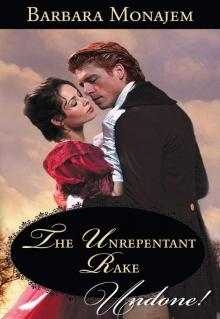 The Unrepentant Rake
The Unrepentant Rake A Lady's Lesson in Seduction
A Lady's Lesson in Seduction Love and the Shameless Lady (Scandalous Kisses Book 3)
Love and the Shameless Lady (Scandalous Kisses Book 3) The Redemption of the Shrew
The Redemption of the Shrew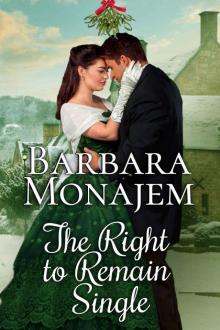 The Right to Remain Single_A Ghostly Mystery Romance Novella
The Right to Remain Single_A Ghostly Mystery Romance Novella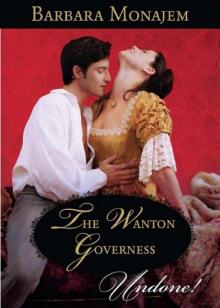 The Wanton Governess
The Wanton Governess UNDER A CHRISTMAS SPELL
UNDER A CHRISTMAS SPELL The Christmas Knot
The Christmas Knot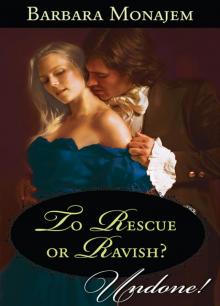 To Rescue or Ravish?
To Rescue or Ravish?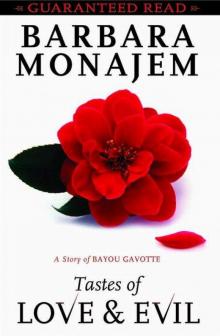 A Taste of Love and Evil
A Taste of Love and Evil![[Bayou Gavotte 03.0] Heart of Constantine Read online](http://i1.bookreadfree.com/i2/04/11/bayou_gavotte_03_0_heart_of_constantine_preview.jpg) [Bayou Gavotte 03.0] Heart of Constantine
[Bayou Gavotte 03.0] Heart of Constantine